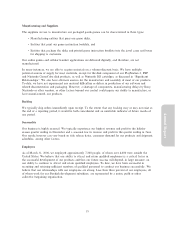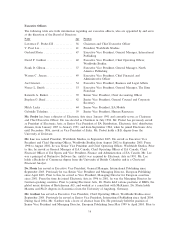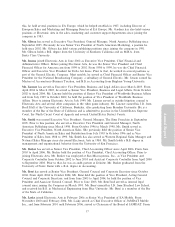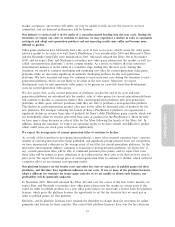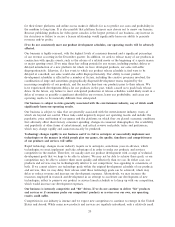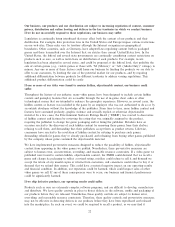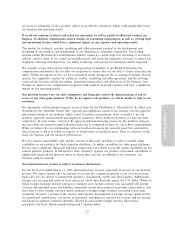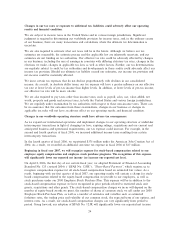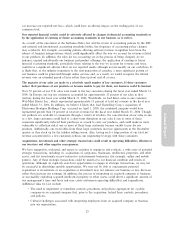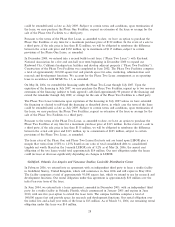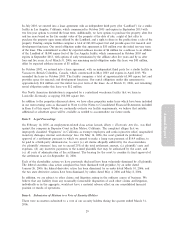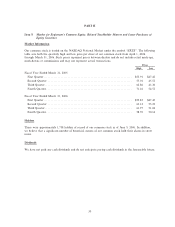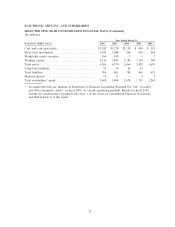Electronic Arts 2006 Annual Report Download - page 96
Download and view the complete annual report
Please find page 96 of the 2006 Electronic Arts annual report below. You can navigate through the pages in the report by either clicking on the pages listed below, or by using the keyword search tool below to find specific information within the annual report.Changes in our tax rates or exposure to additional tax liabilities could adversely aÅect our operating
results and Ñnancial condition.
We are subject to income taxes in the United States and in various foreign jurisdictions. SigniÑcant
judgment is required in determining our worldwide provision for income taxes, and, in the ordinary course
of our business, there are many transactions and calculations where the ultimate tax determination is
uncertain.
We are also required to estimate what our taxes will be in the future. Although we believe our tax
estimates are reasonable, the estimate process and the applicable law are inherently uncertain, and our
estimates are not binding on tax authorities. Our eÅective tax rate could be adversely aÅected by changes
in our business, including the mix of earnings in countries with diÅering statutory tax rates, changes in the
elections we make, changes in applicable tax laws as well as other factors. Further, our tax determinations
are regularly subject to audit by tax authorities and developments in those audits could adversely aÅect our
income tax provision. Should our ultimate tax liability exceed our estimates, our income tax provision and
net income could be materially aÅected.
We incur certain tax expenses that do not decline proportionately with declines in our consolidated
income. As a result, in absolute dollar terms, our tax expense will have a greater inÖuence on our eÅective
tax rate at lower levels of pre-tax income than higher levels. In addition, at lower levels of pre-tax income,
our eÅective tax rate will be more volatile.
We are also required to pay taxes other than income taxes, such as payroll, sales, use, value-added, net
worth, property and goods and services taxes, in both the United States and various foreign jurisdictions.
We are regularly under examination by tax authorities with respect to these non-income taxes. There can
be no assurance that the outcomes from these examinations, changes in our business or changes in
applicable tax rules will not have an adverse eÅect on our operating results and Ñnancial condition.
Changes in our worldwide operating structure could have adverse tax consequences.
As we expand our international operations and implement changes to our operating structure or undertake
intercompany transactions in light of changing tax laws, expiring rulings, acquisitions and our current and
anticipated business and operational requirements, our tax expense could increase. For example, in the
second and fourth quarters of Ñscal 2006, we incurred additional income taxes resulting from certain
intercompany transactions.
In the fourth quarter of Ñscal 2006, we repatriated $375 million under the American Jobs Creation Act of
2004. As a result, we recorded an additional one-time tax expense in Ñscal 2006 of $17 million.
Beginning in Ñscal year 2007, we will recognize expense for stock-based compensation related to our
employee equity compensation and employee stock purchase programs. The recognition of this expense
will signiÑcantly lower our reported net income (or increase our reported net loss).
On April 2, 2006, the Ñrst day of our current Ñscal year, we adopted Statement of Financial Accounting
Standard No. 123 (revised 2004) (""SFAS No. 123R''), ""Share-Based Payment'', which requires us to
recognize compensation expense for all stock-based compensation based on estimated fair values. As a
result, beginning with our Ñrst quarter of Ñscal 2007, our operating results will contain a charge for stock-
based compensation related to the equity-based compensation we provide to our employees, as well as
stock purchases under our 2000 Employee Stock Purchase Plan. This expense will be in addition to the
stock-based compensation expense we have recognized in prior periods related to restricted stock unit
grants, acquisitions and other grants. The stock-based compensation charges we incur will depend on the
number of equity-based awards we grant, the number of shares of common stock we sell under our 2000
Employee Stock Purchase Plan, as well as a number of estimates and variables such as estimated
forfeiture rates, the trading price and volatility of our common stock, the expected term of our options, and
interest rates. As a result, our stock-based compensation charges can vary signiÑcantly from period to
period. Going forward, our adoption of SFAS No. 123R will signiÑcantly lower our reported net income
24



